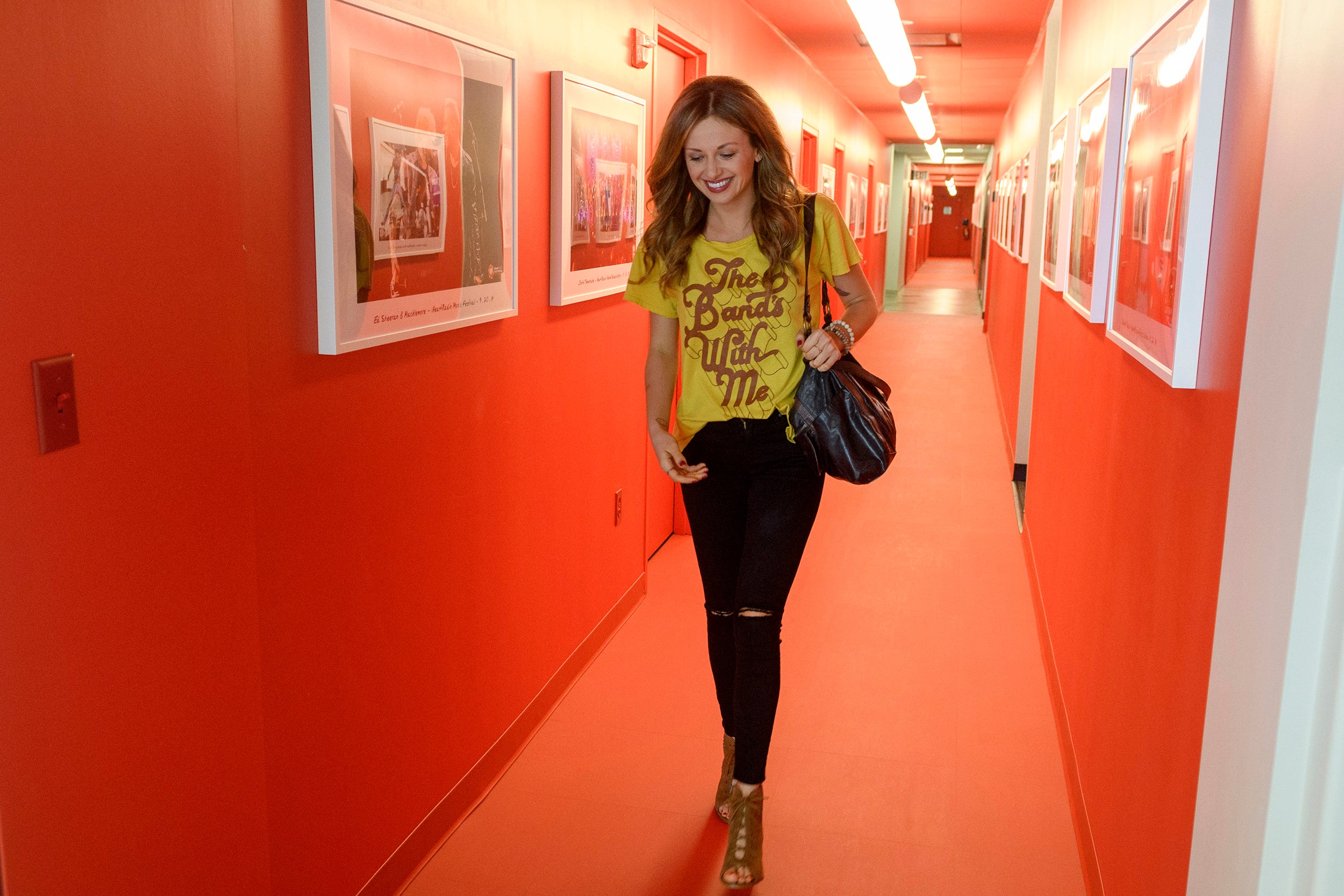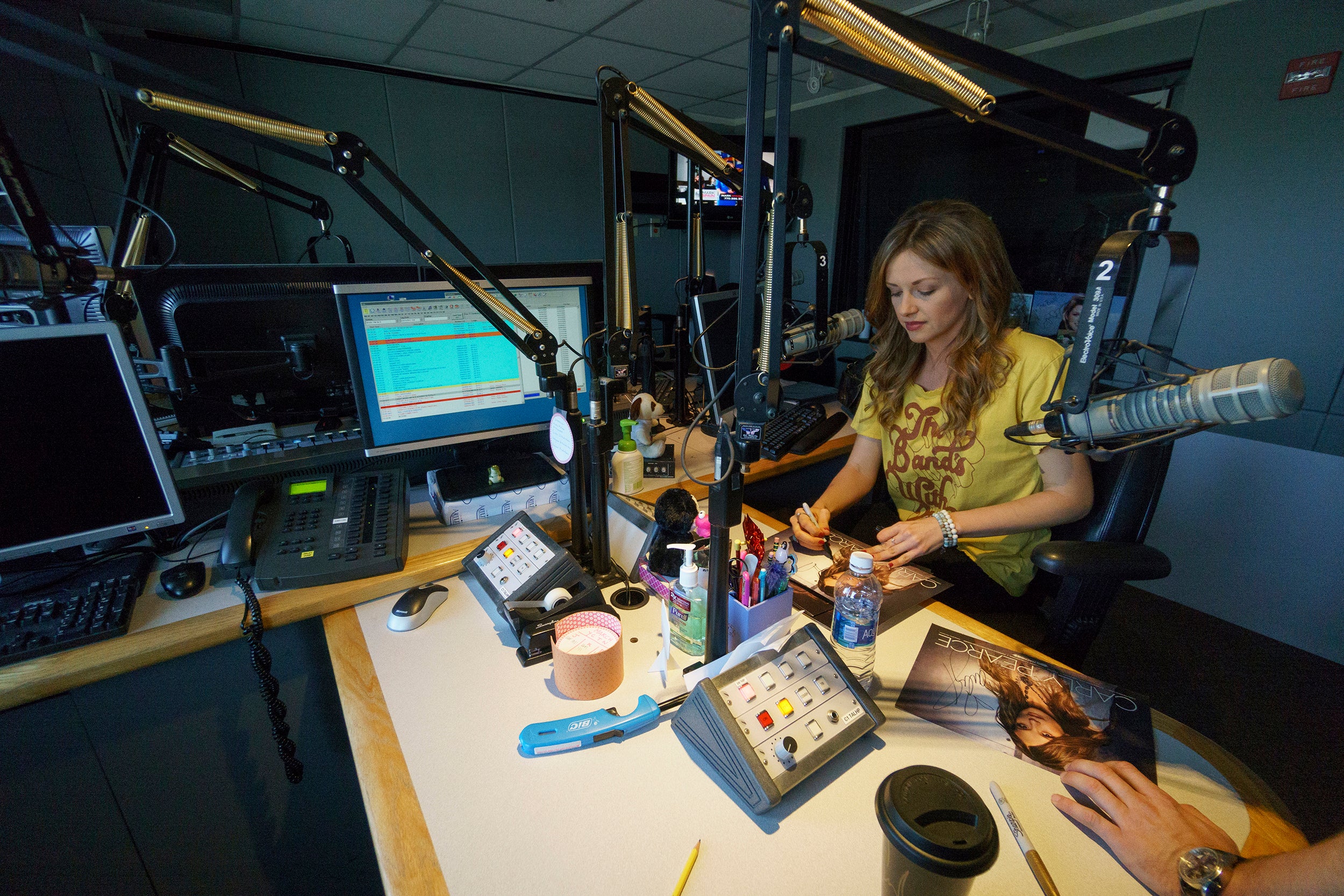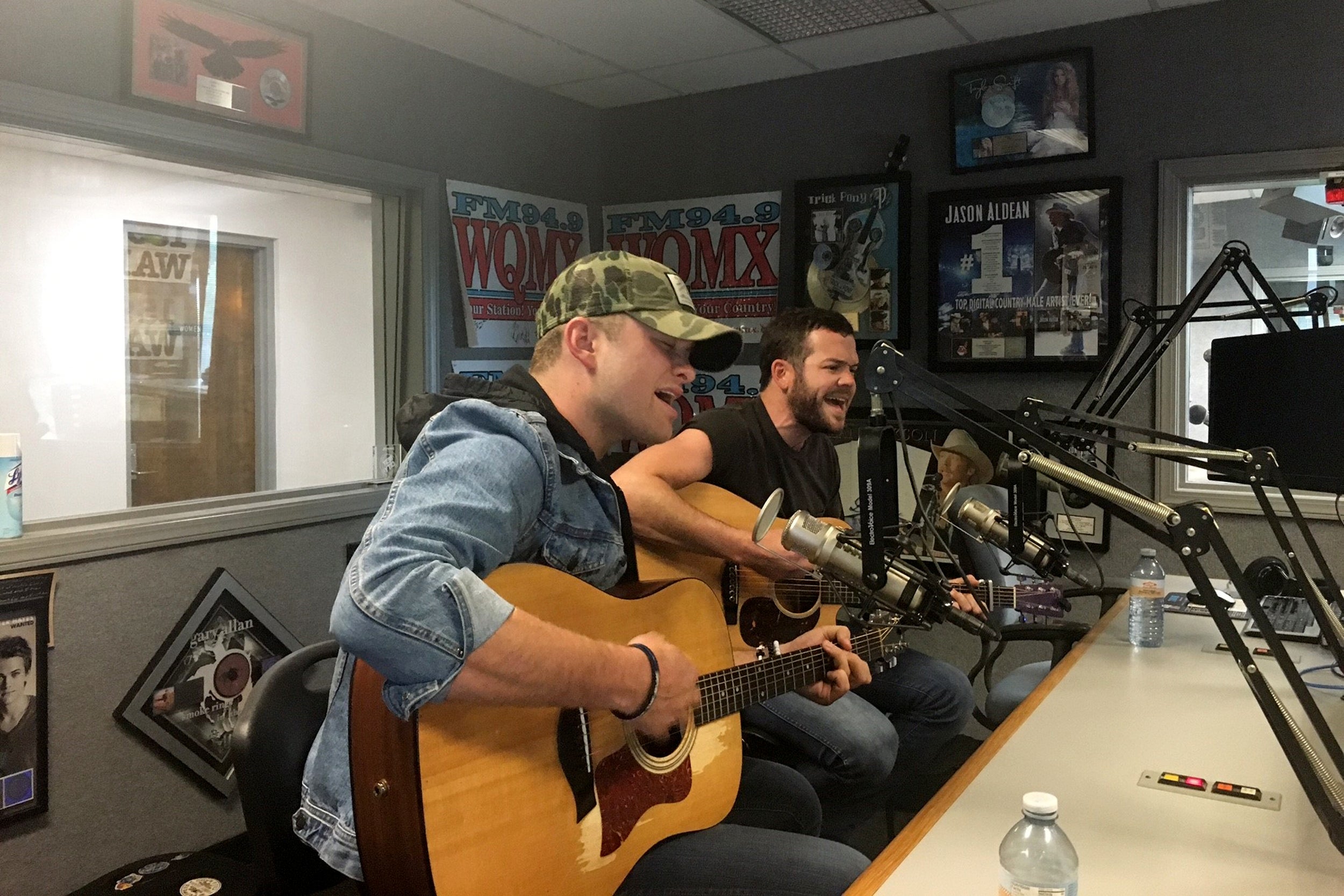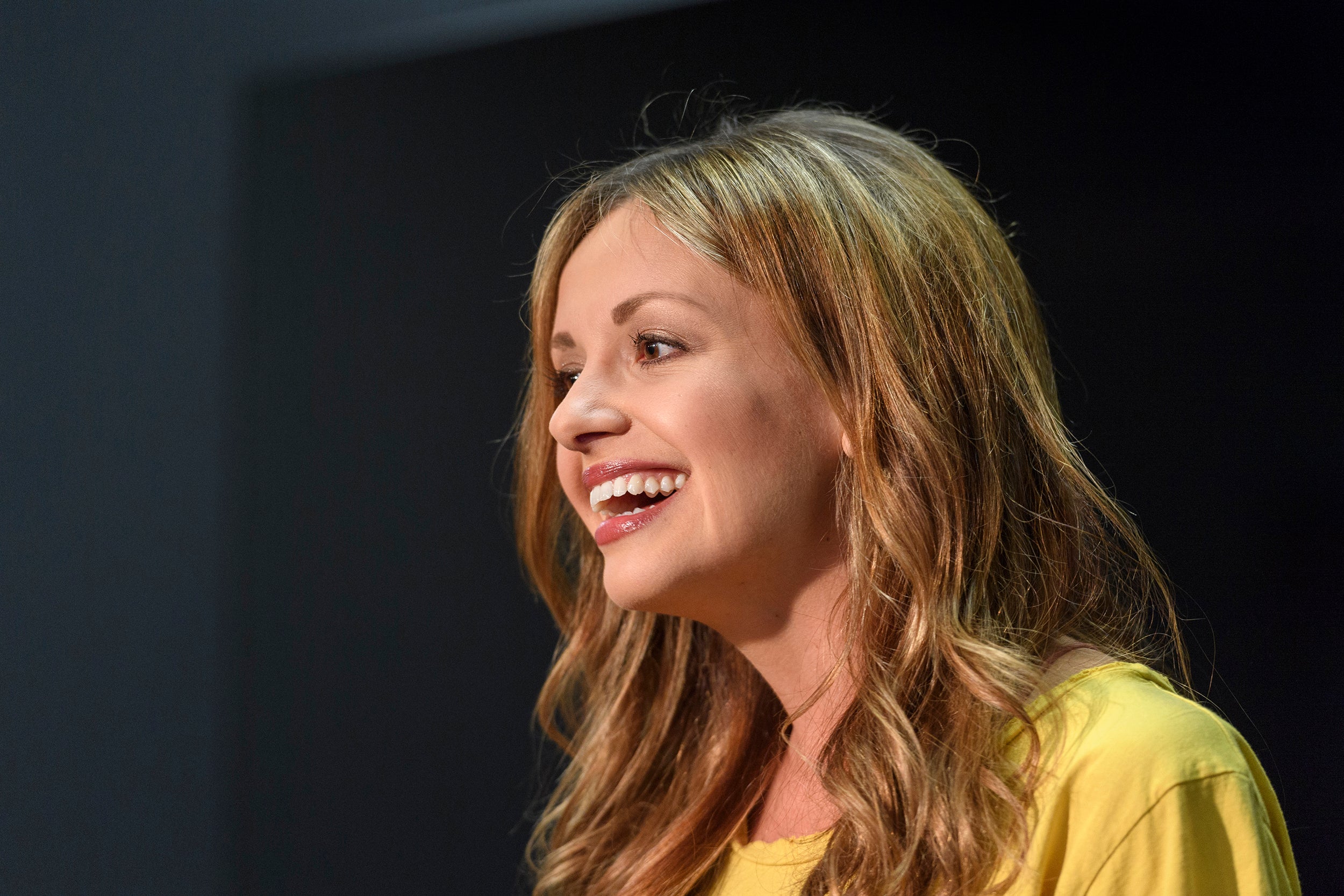'Radio tour is not for the weak': Inside the first step to country music stardom
This Nashville tradition of musicians travelling America to play for radio programmers is crucial for mainstream success. But there's no guarantee it will work

The minutes tick by in a chilly conference room on a sunny day in March as country singer Carly Pearce stands on a small stage. Her fingers brush over her blue and white beaded bracelets, wrapped around a tattoo on the inside of her left wrist that reads, "She believed she could so she did." She got the tattoo years ago, after she lost her first record deal, so when she played guitar, she would look down and see the words and believe her career wasn't over before it ever really started.
Now, Pearce, 27, has another record deal. The day she signed with Big Machine Label Group in January, president Scott Borchetta popped a bottle of champagne from the year Taylor Swift joined the label. Pearce, he said, could be "the most important female artist we've signed since Taylor."
So the pressure is on, because a record deal is only the beginning. Now, Pearce has to impress three people in this conference room at the Bull (94.9 FM), one of Atlanta's country stations.
The assistant programme director arrives. So does the music director. They sit and wait for the programme director, the boss. Except he never shows up. He is pulled into another meeting.
If programme directors like you, they could add your music to their stations. It could move from light to medium to heavy rotation. If enough stations follow suit, your song could climb to No.1 on the charts, so your label could finally release your debut album. Then, you could move from afternoon act on a side stage to opener on the main stage. You could get nominated for awards and earn gold records. You could launch your own club tour, then an arena tour, and eventually become a bona fide country star.

It's a long, regimented road for the lucky ones who make it, one that is deeply ingrained in the very traditional Nashville system. With the exception of a few artists, radio airplay is critical to mainstream country success. Even in 2017 – an era of YouTube, Spotify and curated playlists – radio is the gatekeeper. And it all starts with a radio tour.
For months, singers such as Pearce travel thousands of miles across America to personally introduce themselves and play music for radio programmers. They focus on the approximately 172 country stations whose ratings make up the Billboard and Mediabase charts (out of about 1,850 total in the country).
This Nashville rite of passage is the modern day version of door-to-door sales. Each one can cost a label hundreds of thousands of dollars. And there's absolutely no guarantee it will work.
Country music is the third-largest radio format in the nation, behind Top 40 and adult contemporary, reaching 68 million listeners a week, according to media tracker company Nielsen. While pop stars tend to visit the big markets and hip-hop artists also frequent smaller stations, the relationship between country radio and the genre's singers has always been uniquely close.
In a format that puts a premium on authenticity and connecting with everyday listeners, access is not only appreciated, but it's also expected. A solid bond with radio can go a long way for career longevity. At the Country Radio Seminar conference in Nashville in February, Vince Gill called a group of programmers "a room full of people who are responsible for all of our dreams, in a way. ... We're beholden to you."
Those relationships start with radio tours, which can be traced back to the 1960s, when Loretta Lynn drove around to ask stations to play "I'm a Honky Tonk Girl." The tours are an advantage to programmers, who have limited space to play new songs on their stations. They say the chance to meet new acts early on (Can they really sing? Are they personable? Will they go the distance?) is invaluable. Radio is in the advertising business – if stations make an investment in an artist, it has to pay off.
Singers describe radio tour as an exciting way to tour the country while meeting new people, but it's often grueling. You're essentially on multiple job interviews every day for months, and under pressure to charm people who you're repeatedly told hold the keys to your future. As newcomer Chris Lane, 32, put it, "Radio tour is not for the weak."
It involves endless hours in a rental car or bus or an airplane, travelling with a regional radio representative. You might start at the crack of dawn with vocal warm-ups before a visit to one station in the morning, another meeting or two in the afternoon, and maybe dinner with a station that runs late into the night. Then you have to be up in a few hours to travel again.
Performances vary; sometimes, you play for a handful of people. Some stations have stages and invite listeners, or they stream your performance on Facebook Live. Sometimes, if they have partnerships with other businesses – such as a restaurant, a home goods expo or a mattress store – they'll ask you to play there, too.
"The thing that you can't really be prepared for is the lack of sleep," said Brett Young, 36, a breakout star whose quick success meant a tour beyond a more typical 12-week span. "I have some great friendships with programme directors and music directors. But you do get to the end of a nine-month stretch like that, and your body starts falling apart."
Another artist talked about a trip to the doctor in a strange city, where he found out that his pain was a symptom of extreme exhaustion.
Although singers receive an advance when they sign a record deal, they don't receive a daily rate during radio tour. While the label initially foots the bill for the costs (it varies, but they can run $7,000 to $10,000 a week) for things including travel and taking station staffers out for meals or drinks, the label can usually recoup that money from the artist's future earnings.
"Radio tour was the hardest time in my life," Kelsea Ballerini, 23, recently told radio host Bobby Bones on his podcast. "I was exhausted. You don't get paid, and everyone around you does. ... I remember there was one time where I couldn't pay my rent when I got home. And it was actually during my (Grand Ole) Opry debut, and all my family and friends were there, and I was like: 'Do I ask my parents to pay my rent? What do I do?'"

Ballerini's 22-week radio tour was worth it. Last year, she became the first woman in country music history to have her first three singles go to No. 1, which fueled her debut album, The First Time, to gold-certified status. In February, she was nominated for best new artist at the Grammy Awards.
That's the light at the end of the tunnel that artists hope for – as many emphasise, the alternative is sitting at home, not playing your music.
"Everyone warned us, 'This will be one of the most strenuous things you've ever done,' " said Johnny McGuire. He's a member of the duo Walker McGuire with Jordan Walker; they recently embarked on a radio tour to promote their first single, "Til Tomorrow." "But at the end of the day, Jordan and I ... we're doing what we've always wanted to do. I think it's just all relative. For us, it's not bad. We love it."
Walker agreed. "That seems so far-fetched five years ago when I moved to town," he said. "Thinking to myself, 'My song is going to be on country radio.' That would've been crazy to think about. I'm getting choked up thinking about it."
Pearce takes it in stride when the Atlanta programme director, Brian Michel, misses her performance. (Later, Michel says he wishes he could have been there, but he trusts his colleagues to report back to him.) Still, even after she sings for the other radio employees – who burst into enthusiastic applause – and sits for a station interview in which the assistant program director, Angie Ward, dubs her a singer with "a beautiful smile and a beautiful voice," an uneasy silence falls over Pearce's team as they walk out of the building. That was not how the visit, scheduled long ago, was supposed to play out.
But they shake it off. Because they have to immediately head to the next Atlanta station.
Pearce offers the story of a fellow singer on radio tour who performed a deeply emotional track, only to have the programme director leave in the middle to get a candy bar from the vending machine. So when it comes to radio tours, Pearce has learned to "expect the unexpected."
It's how the Kentucky native has approached her whole career. She landed a publishing deal as a writer after she moved to Nashville at age 19, and then a developmental record deal that fell through. The buzz around her disappeared, and she babysat and cleaned Airbnb rental units while she figured out her next move.
In 2015, her publisher put her in contact with busbee, a hit pop producer looking to work with country singers. They clicked immediately and, with Emily Shackelton, wrote "Every Little Thing," a haunting ballad about a failed relationship. When SiriusXM's country station, the Highway, put it in rotation late last year, the song began selling 6,000 copies a week. Soon, Borchetta was in touch, and Pearce's career has been full-speed ahead.
A slow song from a new singer is risky in the generally up-tempo world of country radio - and women already have a tough time getting airplay. But in the middle of her radio tour, "Every Little Thing" landed the coveted "On the Verge" distinction from iHeartMedia radio group, so all of the company's country stations are required to play it a certain number of times. Currently in the Top 25, it's picking up steam.
"I was just eight years into town, sometimes laying down at night going, 'Is it going to happen?'" Pearce said. "I think I needed to be reminded to just stay authentic and not chase approval from Music Row. Because at the end of the day, they can see through it, and so can the listener."
Jon Loba, executive vice president of BBR Music Group, has a rule: "It'll probably be a cold day in hell before I don't send a new act on a radio tour."
Loba has learned this lesson every time he wondered if the model was outdated. When he signed the band Parmalee, he didn't send the group on a full tour, but only to stations in cities where it was already playing a concert. Parmalee's debut single didn't take off in 2012, and Loba's promotional team told him: "Radio wonders what we're hiding. Or if Parmalee's too good to visit them."
Same with Justin Moore in 2008, who launched his first single with just a video. When it got a lukewarm reception, Loba was told: "Radio doesn't know who he is; they feel like they've got no relationship. So they're not going to give him the benefit of the doubt."

In the end, Loba sent Parmalee and Moore on traditional tours for their second singles. They both went to No. 1.
"I'm sure it was partly music-based," Loba said. "But it was also absolutely that programmers could now say: 'I get it. I believe in this act.' "
Programme directors reiterate that it all comes down to the quality of the music; although if they meet an artist who really shines in person, it could give that act an edge.
"If you're respectful and treat people with kindness no matter what, you're always viewed in a favourable light," said MoJoe Roberts, program director for the Bull (98.7 FM) in Portland, Oregon. "(That's) any artist, or any person in any line of work."
However, said Kris Daniels, program director for the Coyote (102.7 FM) in Las Vegas, "If the song ... doesn't test well, it doesn't matter how good their personality is."
While singers hesitate to publicly say anything negative about radio for fear of the consequences, behind closed doors there is talk of radio tour "horror stories" – including dismissive radio staffers and offensive comments, particularly toward young female singers.
Programmers have anecdotes of singers who come through the station who aren't ready for prime time, or who behave inappropriately.
Some artists are afraid of doing anything – even accidentally – that could offend radio. Ryan Hurd, a new artist whose debut single is "Love in a Bar," recalls when he had to cancel a visit because he needed to return home to Nashville for personal reasons. He and his manager were genuinely worried to tell the station about it.
"We were really nervous because the perception is that if you scorn radio – ever – that's your shot, you blew it," Hurd said.
But when his manager called the station, the staffers understood the situation and agreed to reschedule. It was a valuable lesson.
Radio tour "has gotten such a reputation for being difficult and for being so much harsher than it actually is, that you forget these are real people who still love music," Hurd said. "There's a human element to this that people often overlook."
For Pearce, the afternoon stop in Atlanta is at the Cumulus Media headquarters, which brings her to another conference room. About a dozen people sit in swivel chairs, listening expectantly.
It's a quick visit – after her label's radio representative introduces her, she has only a few seconds to introduce each song.
"If you've known me for five minutes, which y'all have, it's time for me to tell you I have a true obsession with red wine," she said, introducing "Hide the Wine." The people in the room murmur appreciatively. "And sometimes you make decisions that are questionable while under the influence of red wine."
To close the performance, she tells the backstory of "Every Little Thing": "I wrote this song about a guy who broke my heart a few years ago, and wanted to take you on a journey of my personal story." She belts out the ballad, accompanied by her backup musicians:
"Guess you forgot what you told me, because you left my heart on the floor
"Baby, your ghost still haunts me, but I don't want to sleep with him no more"
The small crowd claps loudly. Some exit the room quickly to go back to their offices, but others linger, making small talk and asking Pearce if she'll take a photo.
She can't stay long, because she has to fly to Florida. Then South Carolina, then Colorado, then back to Florida, then Nevada, and on and on, while her team works the phones back in Nashville, calling stations and urging them to play Carly Pearce. And so it will continue, because ultimately, hopefully, it will lead to her dream.
"Radio tour is the most exciting, exhausting, unique, hilarious thing I've ever done," she said. "This is all I've ever wanted."
© Washington Post
Join our commenting forum
Join thought-provoking conversations, follow other Independent readers and see their replies
Comments
Bookmark popover
Removed from bookmarks